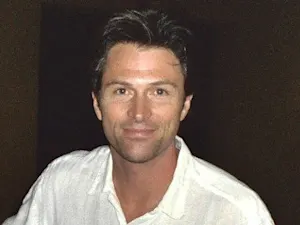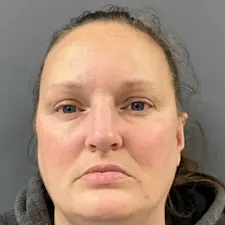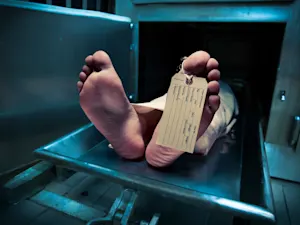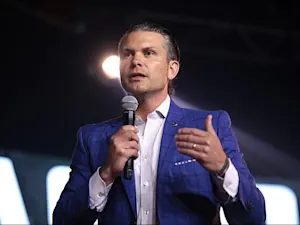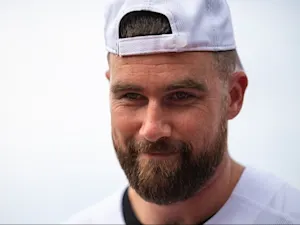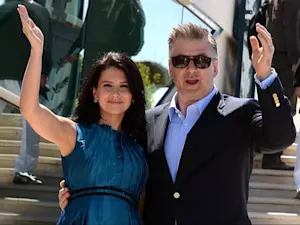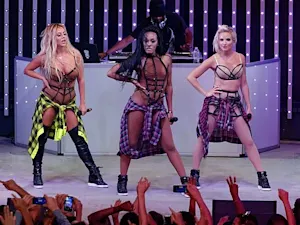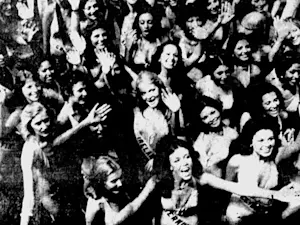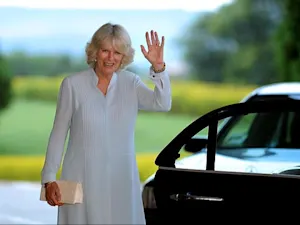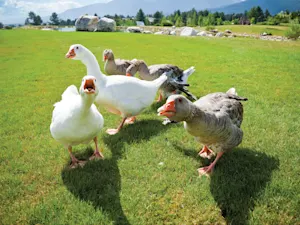
Glen Powell Reveals Why He Said 'No'
Glen Powell on the red carpet at the Big Screen Achievement Awards at the 2025 CinemaCon at The Colosseum Theater at Caesars Palace in Las Vegas, Nevada. Photo courtesy of Gage Skidmore under CC BY-SA 2.0.
Glen Powell's recent revelation about a cringe-worthy encounter with a "canceled" celebrity at a Hollywood party offers a rare glimpse into the complex dance of fame, reputation, and personal boundaries in Tinseltown. On the latest episode of the "Therapuss" podcast, Powell recounted a moment that was as uncomfortable as it was revealing — a moment where he chose to draw a clear line between admiration for an artist's work and disapproval of their personal choices. This story is not just about a photo op gone wrong; it's a striking example of moral clarity in a world often clouded by image management and public relations spin.
A Star-Studded Party With a Dark Cloud
The setting was one of those classic Hollywood parties, the kind where cameras flash, press buzzes, and every handshake might be a headline. Powell, known for his roles in "Top Gun: Maverick" and the upcoming Hulu comedy "Chad Powers," showed up ready to mingle. But the night took a sharp turn when he found himself face-to-face with a celebrity who had recently been engulfed in controversy and public backlash. This was no ordinary encounter. The unnamed star had been "on the ropes" in terms of getting canceled, a phrase Powell used to describe the precarious position of someone whose past misdeeds had caught up with them in the court of public opinion, as reported by Page Six.
Powell admitted he was initially excited. This person had starred in some of his favorite movies, and the actor was genuinely a fan. The celebrity approached with a friendly greeting, and Powell responded with enthusiasm. But the mood shifted when a photographer asked if they would pose for a picture together. Suddenly, Powell hesitated. The decision to decline was not easy, but it was immediate and resolute.
When Admiration Meets Discomfort
The hesitation was palpable. Powell described the celebrity's face as "toxic," as reported by Entertainment Weekly, a vivid way to capture the emotional and social weight that person carried. According to TooFab.com, he sensed the "visceral reaction" others had toward the star because of the "bad choices" they had made. This was not just about a photo; it was about the unspoken consequences of public actions and the ripple effects on personal interactions.
Powell's refusal to pose was a quiet but powerful act of boundary-setting. The celebrity reportedly noticed his reluctance, but Powell stood firm. In a culture where image often trumps integrity, this moment of honesty stands out. It's a reminder that even in the glittering world of Hollywood, not all connections are worth making, especially when they come with a toxic legacy.
Life Imitates Art: The 'Chad Powers' Parallel
What makes Powell's story even more compelling is how it mirrors the character he plays in "Chad Powers." The Hulu comedy follows Russ Holliday, a disgraced football star who attempts to redeem himself by disguising his identity and joining a new team. Holliday's journey is one of accountability, regret, and the struggle for forgiveness — a stark contrast to the unnamed celebrity's apparent inability to move past their mistakes.
Powell explained that Russ Holliday is a character who made a mistake but is not inherently bad. He owns up to his errors and seeks redemption, a narrative that resonates deeply in today's cancel culture climate. Powell's real-life encounter, however, involved someone who, in his words, "should lie where they're shot," as reported by Entertainment Weekly, a blunt expression of the unforgiving nature of public judgment when accountability is absent or insufficient.
The Weight of Cancel Culture
Powell's reflections highlight a broader cultural conversation about cancel culture and its impact on celebrities. He noted how the world today rarely lets people forget their mistakes, creating an environment where redemption is elusive. This reality shapes not only public perception but also private interactions, as Powell's story vividly illustrates.
In Hollywood, where careers can be made or broken overnight, the stakes are high. Powell's experience reveals the tension between personal admiration for an artist's work and the moral reckoning with their off-screen behavior. It's a delicate balance that many in the industry must navigate, often under the relentless gaze of the media and public opinion.
A Moment of Moral Clarity
What makes Powell's story so captivating is the rare moment of moral clarity it represents. In a world where many might have smiled for the camera despite their reservations, Powell chose authenticity over convenience. His decision to decline the photo op was a subtle but significant stand, a reminder that personal integrity can still hold sway amid the glitz and glamour.
This encounter also serves as a cautionary tale about the cost of public missteps and the long shadows they cast. For Powell, it was a moment to reflect on the kind of company he wants to keep and the values he stands for, both on and off the screen.
What's Next for Glen Powell?
As "Chad Powers" premieres with its two-episode launch and weekly releases, Powell's portrayal of Russ Holliday offers a nuanced look at fame, failure, and the quest for redemption. His real-life story adds an extra layer of authenticity to the role, showing that sometimes, the most compelling drama happens behind the scenes.
References: Glen Powell details uncomfortable moment with 'toxic' celebrity who was 'recently canceled' | Glen Powell recalls awkward encounter with 'recently canceled' celebrity | Glen Powell Recalls Awkward Encounter with 'Toxic' & 'Canceled' Star

